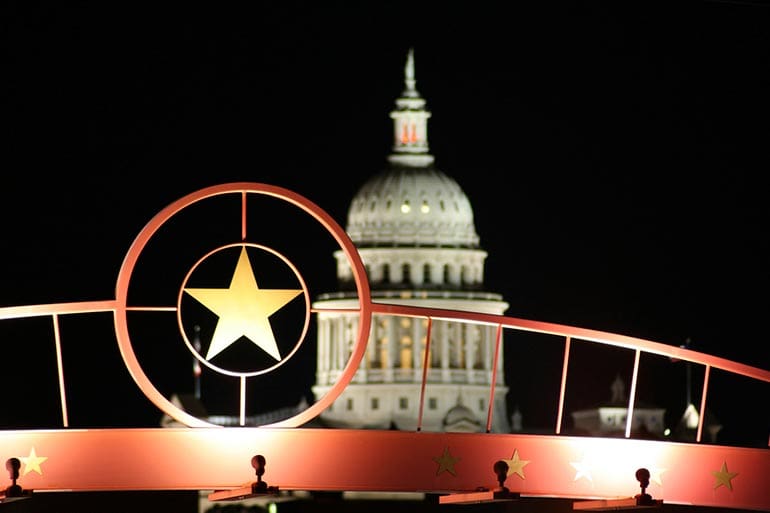
After a surprisingly difficult trip involving a cancelled flight after a two hour delay on the tarmac (followed by a great conversation with U.S. Airways that ended with me telling them, “Just give me my property and my money back, and I’ll drive there,”) and a spontaneous road trip punctuated by a tire blow-out caused by…well, no real reason I can discern…I managed to stagger in to the National Firearms Law Seminar this morning. So far, I’ve heard two very interesting lectures from George Mason Professor Joyce Lee Malcom and attorney and scholar Stephen Halbrook. The general outline of the story is probably familiar to those who have been around the block in the gun rights community, but there were a few salient points worth noting . . .
Professor Malcom spent some time talking about the legal history of firearms laws in the United Kingdom, and how it’s a cautionary tale. Interestingly, she described that in the 19th century, while the British police were disarmed, the public was unfettered in its ability to possess and carry firearms. Police, when pursuing criminals, would sometimes commandeer weapons from the citizenry when needed.
During World War I, H.M.’s Government acquired quite a bit of power over firearms that it was reluctant to let go of after the war (never let a crisis go to waste). Professor Malcom mentioned fears of Bolshevism in the post war era. I wonder if what we might term ‘imperial blowback‘ might also have been concentrating their minds).
Starting in 1920, the Brits passed a firearms control act which required registration. And registration required people to have a ‘good reason’ for possessing a firearm. The Home Office (which controls local police in the UK) started ratcheting back what qualified as a “good reason” (in a confidential memorandum, naturally). Living in a remote area was sometimes sufficient reason. Being a member of the government (naturally) was another.
She then detailed a bit that could easily have been written by RF for one of his “this is what happens to a disarmed populace” posts. In 1987, a massacre occured in the British town of Hungerford, perpetrated by a deranged man armed with an AK 47 variant, an M1 Carbine, and a Beretta 92FS pistol. Seventeen people were killed. Since both the citizenry and police were disarmed, the perpetrator was allowed to run wild for a number of hours (Prof. Malcom said eight; the Wikipedia entry suggests it was closer to five) before finally being cornered by (armed) police in a local technical college.
In the subsequent debate that resulted in more stringent gun control laws, the MP for Hungerford reportedly praised the police for their “rapid response” to the crime. You read that correctly.
Steven Halbrook gave a very interesting talk about some current and pending litigation, and the “massive resistance” that some lower courts are engaging in to resist the implications of the Heller and MacDonald cases. I hesitate to write about anything legal without reading the cases (that’s the lawyer in me talking,) but his discussion of firearms in common use for lawful purposes by law-abiding citizens (the test from Heller) made one point that really stuck out to me.
In the 1920s, there was a movement to ban handguns in the USA. One of the arguments proffered at the time by its advocates (remember, this is pre-National Firearms Act), was that handguns were not needed…because sawed-off shotguns would be a much more effective tool for self-defense than a handgun.
I suppose consistency isn’t something that we should expect from the anti-gunners, eh?




If your encounter with US Air ended that amicably you got off lucky. That airline is a compelling argument for the TSA and gun “free” zones at airports.
Flown Southwest recently?
I’m a Delta guy. Wouldnt fly southwest if it was free based on what I’ve heard recently.
I suppose consistency isn’t something that we should expect from the anti-gunners, eh?
If not for double-standards, they’d have no standards at all.
Great post, JP, and thanks. Jeez, if not for TTAG you would NEVER see this kind of stuff in the blogosphere…
never mind the Reliable Party Organs…
were I an aspiring journolist, I’d be monitoring THIS SITE for good gun issue ideas,
and surely NOT going off to some bunkum propaganda training seminar like Columbia School of Journolisms collaboration with Bloomberg…
Sawed off shotguns, advice from the 1920’s? Jeez, I never knew Shotgun Joe Biden was THAT old…:)
Seriously, to go with this great info on background- here is a link found at MDShooters worthy of cross-post-
By someone who actually DOES know what he is talking about, Mas Ayoob, and great data context provided by Clayton Cramer- here:
http://www.gundigest.com/concealed-carry-news/stand-your-ground-law-myths-debunked?et_mid=738276&rid=236899596
The gratuitous slap at US Airways added nothing to the article. I am not a US Airways / American Airlines employee or stockholder but I do fly with them routinely because they dominate the Washington DC area as far as number of departures and arrivals they offer in comparison to the competition. Travelandliesure.com rated US Airways as a standalone carrier as #2 of the big 5 carriers last year with an on-time percentage of 81% which is only 2% behind the large carrier leader Delta at 83%. SWA brought up the rear at 75%. The differences may be statistically meaningless as there are so many variables that go into delays with weather and air traffic being two of the biggest. Better that a company take the delay that operate with an unsafe airplane or crew.
When I went to school, those percentages certainly weren’t “A” grades. In fact, several were “C” grades.
I’m not the author, but I don’t see any reason to White Knight less than stellar ratings for companies that have forgotten that they are part of a service industry in which one of the primary requirements is making customers happy.
I agree with Sig. US Airways sucks.
For the record, the comment was directed about customer service response afterward, not their decision to cancel a flight on an aircraft that was not airworthy.
The tire whose failed sidewall caused another delay was made by Michelin, in the interests of fairness.
Tire Discounters in Grove City, Ohio were great, though.
When the exercise of a natural right is based upon “justifiable need” then the exercise of that right is forever in jeopardy. Shall not be infringed was simply brilliant. It’s up to the People to put government’s feet to the fire every blessed time it violates that.
Is this seminar available on video or audio? I would love to hear what Stephan Halbrook and the presenter had to say. Unfortunately I could not attend.
I don’t believe so. I think he will speak again at a seminar in Delaware in the near future, though.
Missouri Mule – awesome screen name!
Yours enviously,
Missouri Sock Monkey
Politicians support their own private army to a T while working to ensure the taxpayers are nothing more than disarmed little creatures to be Lorded over by them. For this to work gun elimination is necessary. Let’s not call it gun control because that’s not the ultimate goal here.
There’s more to the handgun ban story from the 1920s. One report I read went so far as to claim that when Congress was debating the National Firearms Act (NFA) bill in the early 1930s to deal with the expanded gangsterism fueled by Prohibition, Roosevelt wanted certain firearms, including handguns, banned outright. But his AG advised him that the SCOTUS likely would overturn the law if this clause were included. So the registration and tax scheme was substituted for a ban. Enough ‘conservative’ Democrats protested, that handguns were pulled from the bill. But curiously, the phrase containing the description of readily concealable firearms made from shotguns and rifles, i.e., SBS and SBR, was retained. That’s only a snippet of the story, but perhaps what is most important to remember is what federal authorities gleaned from this law. They now had an effective way to control and manipulate our Constitutional rights out of existence through regulation and taxation. All they had to do was declare their restrictions only applied to commerce (some could argue this was already accomplished by Wilson via the Harrison Narcotics Act of 1914). But the worst was yet to come when the high court decided in Wickard v. Filburn (1942), that the Constitution’s ‘”commerce clause” now meant the feds could control and restrict all forms of trade simply by arguing that the mere existence of a commodity or service impacted interstate trade in some manner, no matter how trivial. The traditional interpretation of the clause, that the feds were supposed to ensure free and open trade between the states, and remove all barriers to trade, was supplanted by a purposeful misinterpretation of the original meaning of the term ‘regulate’ (to make trade regular and free flowing). The clause now was interpreted to mean restrict and control. The net effect was that it gave all branches of federal government more authority and power than they had ever enjoyed before, and nobody or government could stop them. At the time, few appeared to want to, and so over the next 3/4 of a century we’ve seen this problem grow worse across the spectrum of human endeavor. Slowly, we are turning back the tide, but it has been, and will continue to be, a Herculean task, requiring the efforts of successive generations of Americans who still retain and value their free will.
Excellent post, but…
requiring the efforts of successive generations of Americans who still retain and value their free will.
Good luck because that strategy will fail. There is a reason that the founders of this nation wrote the Declaration of Independence and their grievances were far fewer and for relatively milder government burdens than we endure today. Generations of thousands of years in human history didn’t do what these men and women did in one. Mass civil disobedience and then, if government doesn’t get its house in order, organized separation from the Union. I hope for the success of the former but we’ve gotten so far away from the real exercise of individual Liberty that I fear the latter will be necessary. Kicking this can down the road is a fool’s errand. It’s well past the time for us to haul our own water. Plan to fix what ails the nation in this generation or don’t expect it to be fixed at all.
Comments are closed.